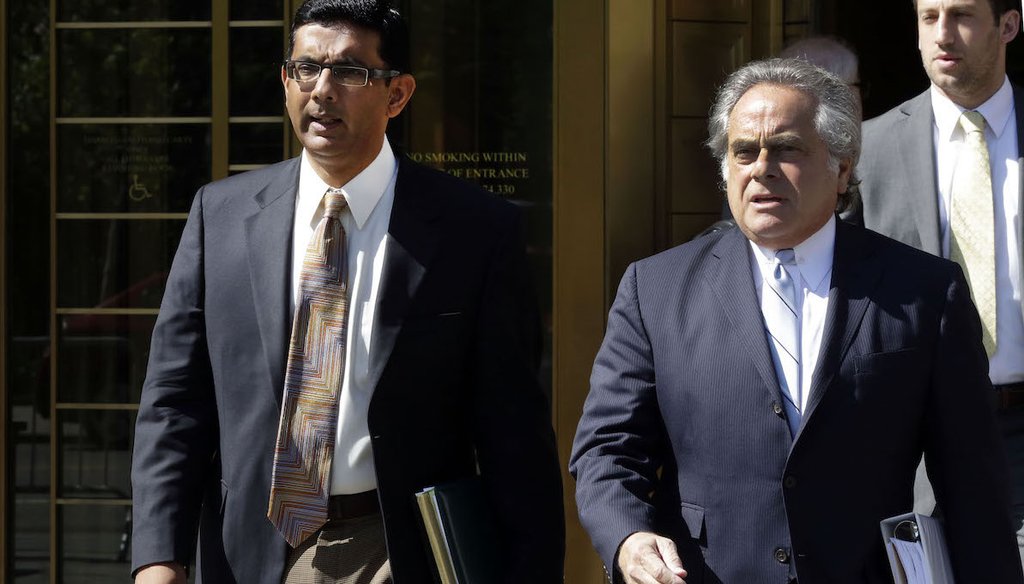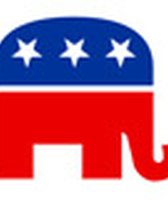Stand up for the facts!
Our only agenda is to publish the truth so you can be an informed participant in democracy.
We need your help.
I would like to contribute

President Donald Trump announced he would pardon Dinesh D'Souza, who pleaded guilty to making illegal campaign contributions in 2014 on May 31, 2018.
President Donald Trump announced he would pardon controversial conservative pundit Dinesh D’Souza on May 31, 2018: "Will be giving a Full Pardon to Dinesh D’Souza today. He was treated very unfairly by our government!" Trump tweeted.
Whether D’Souza was treated "unfairly" or not, we thought it was worth reviewing the facts of the case.
Here’s a closer look at Trump’s fifth presidential pardon.
D’Souza, a best-selling author, made a name for himself as a documentary filmmaker attacking former President Barack Obama. Fact-checkers said D’Souza’s film 2016: Obama’s America was full of distortions.
D’Souza began his career as an adviser to Ronald Reagan and served as president of a small Christian college in New York City, King’s College, between 2010 and 2012. He was forced to resign after the college discovered he was engaged to a woman while still married to another.
Sign up for PolitiFact texts
On May 20, 2014, D’Souza was convicted of a felony for making illegal contributions to Wendy Long’s unsuccessful challenge of Kirsten Gillibrand to represent New York in the United States Senate. Long was a friend from D’Souza’s time at Dartmouth College.
By law, individuals may contribute a maximum of $5,000 to one candidate. In March 2012, D’Souza gave $10,000 on behalf of himself and his wife. He then directed his assistant and a lover to also contribute $5,000 each on behalf of themselves and their spouses for a total of $20,000. D’Souza then reimbursed them.
D’Souza pleaded guilty. He "admitted that he knew that what he was doing was wrong and something the law forbids," the U.S. Attorney's Office for the Southern District of New York said in a statement.
The prosecutor, Preet Bharara, pushed for prison time but Judge Richard Berman sentenced D’Souza to eight months in a supervised community confinement center, five years of probation, and a $30,000 fine.
Bharara was one of 46 United States attorneys appointed by President Barack Obama whom Trump asked to resign, a move D’Souza celebrated.
Republicans argued D’Souza was the victim of selective prosecution. Using the hashtag #pardondinesh, D’Souza and other conservative activists pressed the White House to grant clemency.
"Bravo! @realDonaldTrump," Ted Cruz, R-Tex., tweeted following the pardon announcement. "Dinesh was the subject of a political prosecution, brazenly targeted by the Obama administration bc of his political views. And he's a powerful voice for freedom, systematically dismantling the lies of the Left—which is why they hate him. This is Justice."
But the judge in D’Souza’s case called claims of political persecution "nonsense" during the trial.
In theory, an unfair prosecution could be appealed, said Michael Gerhardt, a constitutional law professor at the University of North Carolina.
"There are appeals they could make to appellate courts that they were singled out for political reasons," Gerhardt said. "D’Souza made his argument not to a court, but to Trump and Trump’s base. He can claim he’s been vindicated."
Other pardons could be on the way. Trump said he is also considering shortening the sentence for Rod Blagojevich, the former Illinois governor who was impeached, and pardoning Martha Stewart, the home decor maven.
As we’ve written before, the president’s pardon powers are virtually unlimited. The Justice Department lists guidelines, such as that petitioners exhaust other forms of relief (like appeal) or wait at least five years after a conviction or their release from confinement. But the president is not bound by those rules.
James Robenalt, a lawyer at the firm Thompson Hine, said the D'Souza pardon is largely symbolic for subjects of Robert Mueller’s Russia probe. One such subject is Michael Cohen, one of Trump’s personal lawyers under investigation for possibly violating campaign finance laws.
"This is a use of the pardon power to send political messages to people involved in the Mueller investigation," Robenalt said. "Mueller wants them to cooperate in return for a deal. Trump is sending a counter-message. ‘If I just hang tight, whatever happens, the president can pardon me, so I can just not cooperate.’"
Trump previously pardoned Joe Arpaio, who was convicted for criminal contempt when he refused to follow a court order to stop detaining undocumented immigrants; Scooter Libby, a former chief of staff to Vice President Dick Cheney, convicted of obstruction of justice and false statements; and Kristian Saucier, a former Navy sailor who mishandled classified information. Trump posthumously pardoned boxer Jack Johnson, whose conviction has long been regarded as an example of racial prejudice.
Our Sources
Twitter, realDonaldTrump, May 31, 2018
Twitter, Ryan J. Reilly, May 31, 2018
PolitiFact, Trump and pardoning Joe Arpaio: What to know about the process, Aug. 22, 2017
Associated Press, ‘2016: Obama’s America’: Fact checking conservative author Dinesh D’Souza’s film, Aug. 28, 2012
The New York Times, Star Commentator Is Out as Christian College President After Scandal, Oct. 19, 2012
The New York Times, Prosecutors Are Pushing Prison Time for D’Souza, Sept. 11, 2014
FBI, Dinesh D’Souza Sentenced in Manhattan Federal Court to Five Years of Probation for Campaign Finance Fraud, Sept. 23, 2014
Fox News, D'Souza Blasts 'Deceitful' Bharara: He Led a 'Political Prosecution' Against Me share this email, March 13, 2017
Twitter, Ted Cruz, May 31, 2018
Phone interview with Michael Gerhardt, a constitutional law professor at the University of North Carolina, May 31, 2018
Phone interview with James Robenalt, a lawyer at the firm Thompson Hine, May 31, 2018


 PolitiFact Rating:
PolitiFact Rating: 











































